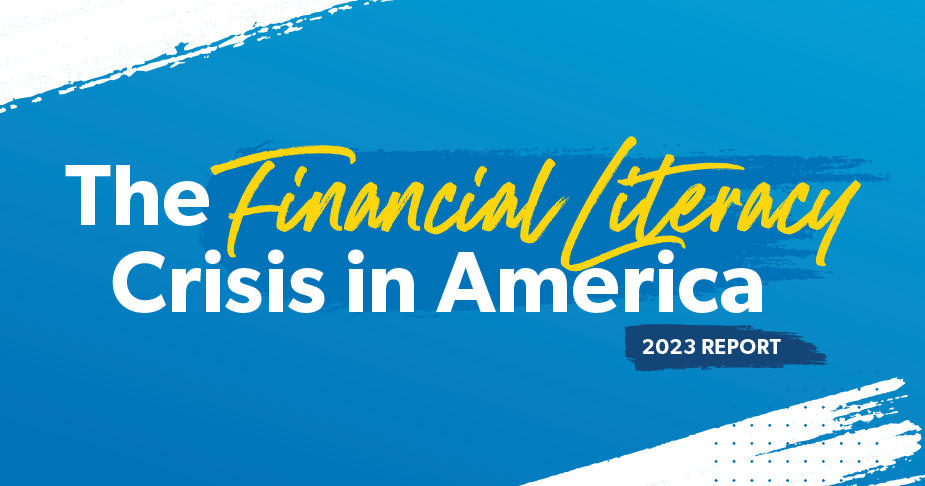
REPORT SUMMARY
- 88% of U.S. adults said high school did not leave them “fully-prepared” for how to handle money in the real world.
- 3 in 4 U.S. adults said in the years after high school, they “often” (32%) or “sometimes” (42%) felt stress because of money.
- 72% of U.S. adults said they would be “further ahead with their money today if they had a personal finance class in high school.”
- Only 17% of U.S. adults said they took a personal finance class in high school.
- Gen Z is the most likely generation to have taken a personal finance course in high school.
- U.S. adults who took a personal finance class are five times more likely to say they graduated high school fully prepared for handling money in the real world.
Downloads
- Research Report (PDF)
- Infographics
Have questions about this study? Email us or visit our newsroom for more information.
Introduction
High school education plays such an important role in preparing today’s students for their future careers. While there’s been consistent focus on and funding for traditional subjects like math and science, there’s been a consistent lack of focus on personal finance education in the classroom.
The Financial Literacy Crisis in America 2023 report focuses on the lack of personal finance education in America and the lasting effects this lack of knowledge has on Americans, even years after they leave high school.
Americans Say High School Left Them Unprepared for Handling Money
Trying to figure out how to pay for college, make rent each month, afford groceries, and save for the future can feel overwhelming. So it’s no wonder the survey shows that many Americans are not confident about their money. In fact, 88% of all Americans said high school did not leave them “fully prepared” for handling money in the real world.
This lack of personal finance education in high school has understandably lead to stress over managing finances for all Americans. In fact, 3 in 4 U.S. adults (74%) said they “often” (32%) or “sometimes” (42%) felt stress because of money.
Americans Regret Not Learning About Personal Finance in High School
It’s pretty much a consensus—Americans regret not learning about money in high school and believe having that knowledge would’ve set them up better to manage their finances. In fact, 8 in 10 U.S. adults agreed they would’ve had a better start with money if they’d learned more about personal finance in high school.
Most Americans say learning about money in high school would’ve made a significant difference in how they deal with money today. Seventy-four percent (74%) said they would’ve made fewer money mistakes, and almost the same number (73%) said they’d be further ahead with their finances. But Americans aren’t just feeling that they’d be better off financially. Three in four (76%) said they would’ve felt less stress around money if they’d just learned about personal finance in high school.
The Lack of Personal Finance Education in America
America’s lack of personal finance education is undeniable: Only 17% of U.S. adults said they took a personal finance class in high school.
This problem is mainly due to the fact that only 25 states currently require a personal finance course as a high school graduation requirement.
Taking a Financial Literacy Course in High School Does Make a Difference
The impact of personal finance education is also clear. U.S. adults who took a high school personal finance class are five times more likely to say they graduated high school fully prepared to handle money in the real world than those who didn’t take a class.
And there are signs the tide may be turning thanks to a renewed effort to increase students’ access to personal finance education in high school. This means that younger generations are more likely to have taken a personal finance course. Gen Z at 30% is the most likely to have taken a personal finance course, compared to their millennial counterparts at 20%. Gen X follows not far behind at 17%, and baby boomers at 7% are the least likely to have taken a course.
Conclusion
The increase of personal finance education in high school is encouraging. With more states instituting personal finance graduation requirements and the effort to provide more awareness around the subject, today’s students are starting to see the effects downstream.
Just as the lack of personal finance education has had a lasting impact, the increased access to personal finance education in high school will have lifelong benefits for today’s students. As time goes on, these changes will be instrumental in helping all students graduate high school with the money skills they need to start their adult lives confident and prepared.
About the Report
Ramsey Market Tracker is a biannual research study conducted by Ramsey Solutions to gain an understanding of personal growth behaviors, attitudes, and opinions of everyday Americans. The nationally representative sample with 2,353 U.S. adults was fielded from December 2–6, 2022 using a third-party research panel.


